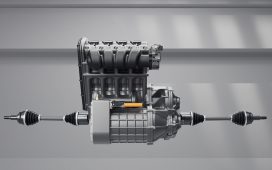Workers at General Motors’ electric vehicle battery manufacturing facilities will be protected by the company’s national contract with the United Auto Workers (UAW), the union’s president, Shawn Fain, announced last week.
It’s a landmark victory in the fight for a “just transition” away from fossil fuels which prioritizes labor rights, boosting hope that workers in legacy vehicle manufacturers’ EV divisions – and across the country’s burgeoning electric vehicle sector – will have the same protections that US autoworkers have historically enjoyed.
“We have been told the EV future must be a race to the bottom,” Fain said on Facebook Live on Friday. “We called their bluff.”
The win came as part of the union’s ongoing – and expanding – strike against the big three US automakers: General Motors, Ford, and Chrysler and Jeep owner Stellantis. It ensures that workers at General Motors’ current and planned battery plants will enjoy whatever safeguards the UAW wins in its master contract agreement with General Motors, even though the factories are joint ventures with other companies.
It will also protect workers at future General Motors plants as the company continues its transition away from fossil fuel-powered vehicles, which it says will be complete by 2035. And it will set a precedent for the rest of the automotive industry – especially at Ford and Stellantis, which have also built out joint-venture EV battery manufacturing facilities, and with whom the UAW is also currently bargaining for a new contract.
“I believe this win with General Motors is the first step towards a just transition for autoworkers,” said Chris Viola, who works at Factory Zero, General Motors’ EV assembly plant in Detroit, Michigan. “A just transition to us means you can keep your job, you’re still making good money, you can still put a roof over your house and feed the family like autoworkers have been able to do for decades.”
Though gasoline-fueled cars still form the base of their business models, the big three are all planning to scale up their electric vehicle production. Ford has pledged to phase out gas-powered cars by 2040, while Stellantis says half its US sales and all of its European sales will be EVs by the end of the decade.
Until now, however, the firms had no plans to maintain autoworkers’ current labor standards in that process.
In 2019, for instance, General Motors phased out car assembly at a plant in Lordstown, Ohio, where workers were earning $32 an hour. Soon after, it opened a joint venture with LG Energy Solution known as Ultium Cells at the same location, offering a starting wage of just $16.50 an hour last year. (That number increased to $20 after workers unionized and negotiated raises.)
The big three have in recent years enjoyed record-breaking profits, and are taking advantage of hundreds of billions of dollars in public incentives to support domestic EV manufacturing – part of 2022’s Inflation Reduction Act.
Despite this, the companies have raised concerns about slim margins on EVs and insisted that increasing wages and improving working conditions could make them uncompetitive with nonunion rival producers like Tesla.
But the recent win could soon help spark unionization among other EV workers, including those at Tesla, which pays its workers significantly less than the big three. Fain has said that after the big three negotiations, the UAW will focus on organizing Tesla workers.
after newsletter promotion
“I hope people are realizing that they have power, especially because the UAW just showed with this GM agreement that we have a leadership that’s really strong,” said Viola. “It will be a battle, but I’m looking forward to it.”
Martha Grevatt, a retired UAW worker for Chrysler (now Stellantis), said that fight is not only crucial to protect workers’ quality of life, but also for their physical safety, as building batteries can expose workers to dangerous chemicals.
“These workers really need strong health and safety language and they need a strong union that’s gonna defend the right to refuse unsafe work,” said Grevatt, who co-chairs the EV transition working group at the UAW caucus Unite All Workers for Democracy, of which UAW president Fain is also a member.
The UAW’s fight to improve conditions for EV workers could also set the stage for future tussles in other sectors of the new green economy. Jobs in renewable energy, for instance, pay less and are less often unionized than those in oil and gas.
Improving those conditions will be necessary to “ensure that a zero emissions economy is one that millions of people politically support and embrace”, said Sydney Ghazarian, an organizer with the climate and labor advocacy group Labor Network for Sustainability.
“While it’s autoworkers on the picket lines now, fighting for socially and economically just transition is something that every worker and every person has a stake in,” she said.










